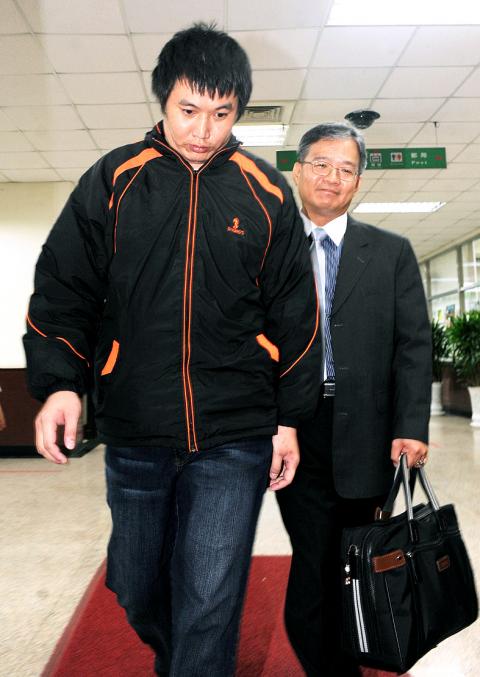The Taiwan High Court yesterday found Hsu Jung-chou (許榮洲) not guilty of the rape and murder of a five-year-old girl in 1996 that had led to the wrongful execution of airman Chiang Kuo-ching (江國慶), and ordered Hsu’s release.
Hsu was charged with the murder by the Taipei District Prosecutors’ Office in May 2011 and that December was sentenced to 18 years in jail by the Taipei District Court.
The High Court’s acquittal left the question of who the real murderer was unanswered.

Photo: Lo Pei-der, Taipei Times
The Taipei District Prosecutors’ Office said it would decide whether to appeal to the Supreme Court once it has read the ruling.
The High Court said Hsu, who is mentally challenged, confessed to the crime on seven occasions, but all the confessions were contradicted by autopsy findings.
The High Court said Hsu’s IQ is between that of a nine and 12-year-old and he has difficulty expressing himself. He cannot write and his initial confession was made to military officials, and was written down by a member of the military who refused to testify during the hearing.
Hsu had confessed to using his fingers to penetrate the victim’s vagina, but the autopsy showed a stick had been used, causing internal injuries. After the youngster died, a knife was inserted through her vagina into her stomach.
The ruling said Hsu left a bloody palm print at the scene of the crime, but no other evidence indicates that he was involved in the crime.
In the first trial, the Taipei District Court ruled that on Sept. 12, 1996, Hsu, who was an airman assigned to the Air Force Command, saw the girl, surnamed Hsieh (謝), watching TV alone at a restaurant at the base. It said he led the girl to a washroom and then took off her clothes before brutally assaulting her and that, to stifle the girl’s cries, he put his hand over her mouth and nose, smothering her.
The case has sparked controversy because the investigation determined that Chiang, who was also serving in the Air Force Command at the time of the incident and was convicted of the crime after a month-long military investigation and was executed the following year, was innocent. Chiang was 21 years old when he was executed.
A military court exonerated Chiang and awarded his family NT$103.18 million (US$3.4 million) in compensation, and filed a lawsuit with the Taipei District Court requiring former minister of national defense Chen Chao-min (陳肇敏), who was then commander of the air force, and other military officials to repay the military for the compensation paid to Chiang’s family.
The military said that its lawsuit to recover the compensation from Chen and others would not be affected by the yesterday’s ruling.
Taipei prosecutors are still investigating whether Chen and seven other military officials had used inappropriate methods to coerce Chiang into confessing.

CHAOS: Iranians took to the streets playing celebratory music after reports of Khamenei’s death on Saturday, while mourners also gathered in Tehran yesterday Iranian Supreme Leader Ayatollah Ali Khamenei was killed in a major attack on Iran launched by Israel and the US, throwing the future of the Islamic republic into doubt and raising the risk of regional instability. Iranian state television and the state-run IRNA news agency announced the 86-year-old’s death early yesterday. US President Donald Trump said it gave Iranians their “greatest chance” to “take back” their country. The announcements came after a joint US and Israeli aerial bombardment that targeted Iranian military and governmental sites. Trump said the “heavy and pinpoint bombing” would continue through the week or as long

TRUST: The KMT said it respected the US’ timing and considerations, and hoped it would continue to honor its commitments to helping Taiwan bolster its defenses and deterrence US President Donald Trump is delaying a multibillion-dollar arms sale to Taiwan to ensure his visit to Beijing is successful, a New York Times report said. The weapons sales package has stalled in the US Department of State, the report said, citing US officials it did not identify. The White House has told agencies not to push forward ahead of Trump’s meeting with Chinese President Xi Jinping (習近平), it said. The two last month held a phone call to discuss trade and geopolitical flashpoints ahead of the summit. Xi raised the Taiwan issue and urged the US to handle arms sales to

State-run CPC Corp, Taiwan (CPC, 台灣中油) yesterday said that it had confirmed on Saturday night with its liquefied natural gas (LNG) and crude oil suppliers that shipments are proceeding as scheduled and that domestic supplies remain unaffected. The CPC yesterday announced the gasoline and diesel prices will rise by NT$0.2 and NT$0.4 per liter, respectively, starting Monday, citing Middle East tensions and blizzards in the eastern United States. CPC also iterated it has been reducing the proportion of crude oil imports from the Middle East and diversifying its supply sources in the past few years in response to geopolitical risks, expanding

Pro-democracy media tycoon Jimmy Lai’s (黎智英) fraud conviction and prison sentence were yesterday overturned by a Hong Kong court, in a surprise legal decision that comes soon after Lai was jailed for 20 years on a separate national security charge. Judges Jeremy Poon (潘兆初), Anthea Pang (彭寶琴) and Derek Pang (彭偉昌) said in the judgement that they allowed the appeal from Lai, and another defendant in the case, to proceed, as a lower court judge had “erred.” “The Court of Appeal gave them leave to appeal against their conviction, allowed their appeals, quashed the convictions and set aside the sentences,” the judges